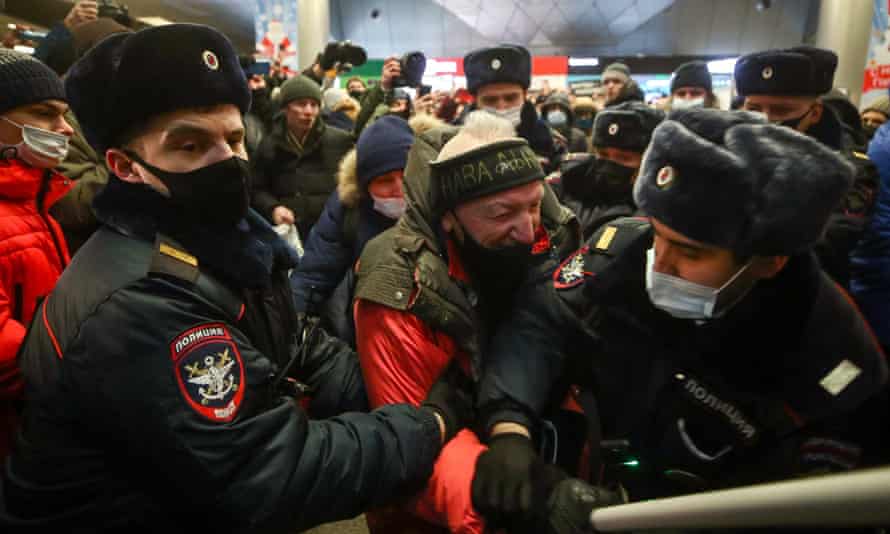The arrest of Alexei Navalny has provoked condemnation around the world, as the US and Europe, as well as prominent activists including Edward Snowden, called for Russian authorities to release the opposition leader.
Navalny was taken into custody on Sunday evening as he returned to Russia for the first time since a suspected poisoning by the FSB last year, risking his freedom in a direct challenge to the Kremlin.
The incoming US administration was quick to condemn the arrest, showing how human rights will likely return to the agenda with Moscow when Donald Trump leaves the White House this week.
Joe Biden’s incoming national security adviser, Jake Sullivan, called for Navalny’s immediate release, adding that the “perpetrators of the outrageous attack on his life must be held accountable”.
A Russian foreign ministry spokeswoman responded: “Deal with the problems in your own country.”
Snowden, the NSA whistleblower who lives in Russia, also tweeted in support of Navalny, calling his arrest a “repetition of mistakes made in the Soviet era”.
@Navalny‘s arrest seems to me a repetition of mistakes made in the Soviet era, seen elsewhere now in the case against #Assange and the war on whistleblowers. States are developing an allergy to opposition—but systems that cannot accept dissent will not survive it. Let him go.
— Edward Snowden (@Snowden) January 17, 2021
The outgoing US administration, which has been hesitant to criticise Vladimir Putin’s government, also condemned Navalny’s arrest later on Sunday evening.
The US secretary of state, Mike Pompeo, said Washington strongly condemned Navalny’s detention, describing it as “the latest in a series of attempts to silence Navalny and other opposition figures and independent voices who are critical of Russian authorities”.
“Confident political leaders do not fear competing voices, nor commit violence against or wrongfully detain political opponents,” he added.
Amnesty International quickly pronounced Navalny a “prisoner of conscience”, saying he “has been deprived of his liberty for his peaceful political activism and for exercising free speech”.
Officials in the UK and European Union also condemned the arrest, with some calling for new sanctions against Russia for violating human rights.
Germany’s foreign minister, Heiko Maas, said: “Russia is bound by its own constitution and by international obligations to the principle of the rule of law and to the protection of civil rights. These principles must, of course, be applied to Alexei Navalny as well. He should be released immediately.”
Navalny was detained at Moscow’s Sheremetyevo airport on Sunday, less than an hour after he flew in from Germany, where he had been recovering from the poisoning with the nerve agent Novichok that he says was ordered by Putin.
Police officers met Navalny at passport control and detained him. Navalny kissed his wife goodbye and gave her a hug. He then disappeared with the officers.
Supporters were temporary unable to find Navalny and began tweeting under the hashtag Where is Navalny to demand information on his arrest. Late on Sunday evening, his lawyer said Navalny was being held at a police station near the airport and that she had not been admitted to see him.
In Russia, officials sought to play down his arrest. Putin’s spokesman Dmitri Peskov claimed not to have heard of the arrest when reached by Russian journalists on Sunday evening: “Please explain. He was arrested in Germany? I’m not following.”
Dmitry Kiselyov, the host of a weekly news show on Russian state television, compared Navalny’s return from Germany to Vladimir Lenin’s journey onboard a sealed train in 1917 in what he called a “revolutionary landing force”.
Sergei Lavrov, the Russian foreign minister, said western leaders were trying to “divert attention from [their] deep crisis”.
The president of the European council, Charles Michel, said Navalny’s detention was “unacceptable”. “I call on Russian authorities to immediately release him,” Michel tweeted.
France’s foreign ministry echoed that call. “With its European partners, it is following the situation with the utmost vigilance and call for his immediate release,” spokeswoman Agnes von der Muhll said in a statement.
The British Foreign Office said it was “deeply concerned … Instead of persecuting the victim of this terrible crime, the Russian authorities should investigate how a chemical weapon came to be used on Russian soil.”
British opposition MPs also criticised Russia. The shadow foreign secretary, Lisa Nandy, said Navalny was “the victim of a cowardly chemical weapons attack. He has shown great courage in returning to his homeland. His detention is unjustifiable and an insult to the Russian people. He must be released immediately and his attackers brought to justice.”
Britain’s defence committee chairman, Tobias Ellwood, called Navalny’s decision to return to Russia “incredibly brave”.

Navalny’s flight had been due to touch down at Moscow’s Vnukovo airport, where hundreds of supporters had gathered. The authorities closed the airport at the last minute, and diverted Navalny’s plane to Sheremetyevo, away from waiting media.
Navalny’s spokesperson, Kira Yarmysh, said in a tweet that Navalny had not been allowed to see a lawyer at the airport or at the police station.
Prior to Navalny’s arrival, Russia’s prisons service said the 44-year-old had violated parole terms from a suspended sentence on a 2014 embezzlement conviction.








